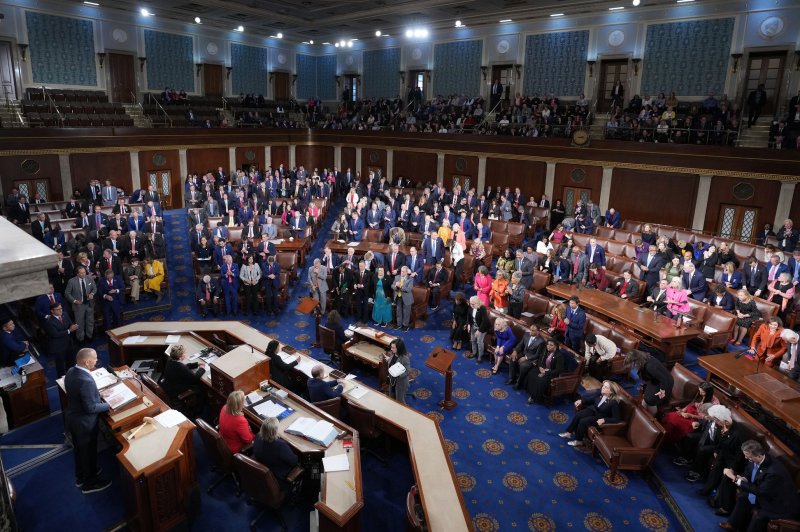1 of 4 | Lawmakers are back on Capitol Hill after their Thanksgiving recess with a dozen work days on the calendar before the holiday recess. File Photo by Pat Benic/UPI |
License Photo
Nov. 27 (UPI) -- A divided Congress returns to work Monday, facing a debate over the national budget, with aid for Israel, Ukraine and Palestinians in the balance.
Lawmakers are back on Capitol Hill after their Thanksgiving recess with a dozen work days on the calendar before the holiday recess. The House and Senate will be in session just another eight days in January before the first deadline to keep the government fully funded on Jan. 19.
In that short time, a tug-of-war over providing aid to Ukraine, Israel and Palestinians will be sticking points that smaller factions within the Democratic and Republican parties are expected to leverage.
During previous House floor debates, Republicans have come out in opposition of packaging multiple issues together under omnibus spending bills, as has been done annuallys. But taking on the vast array of funding needs individually would likely create a time crunch, as the deadline to avoid a government shutdown quickly approaches.
House Speaker Mike Johnson, R-La., faces his second big test in his short time with the gavel. Like his predecessor, Rep. Kevin McCarthy, R-Calif., Johnson seeks a way forward in budget negotiations with some members of his party drawing a hard line on reforming immigration enforcement.
Ninety-three Republicans and two Democrats voted against Johnson's stopgap funding bill earlier this month.
Border enforcement and funding for Ukraine are two issues some Republicans are not opposed to pairing. A group of Republicans, including members of the Freedom Caucus, are calling for continued aid to Ukraine to be contingent on reforms to the U.S. asylum policy and other immigration measures.
The reforms proposed by Republicans are outlined in the "Secure the Border Act" that was introduced earlier this year. These reforms include resuming building the wall at the Mexico border that was started under former President Donald Trump, and changing Department of Homeland Security's policy for dealing with unaccompanied migrant children.
It would authorize DHS to send unaccompanied children to "their country of nationality or last habitual residence," regardless of whether that country borders the United States. DHS would also be able to withdraw a child's application for admission into the United States "even if the child is unable to make an independent decision" about the application.
Senate Majority Leader Chuck Schumer, D-N.Y., signaled a pushback by Democrats in a letter Sunday. He said pairing border policy with aid to Ukraine has "injected a decades old, hyper-partisan issue into overwhelmingly bipartisan priorities."
Meanwhile, some Democrats have called on continued aid for Israel to be predicated by a plan to end the war. Twenty-four Democrats have urged President Joe Biden to support a bilateral ceasefire.
In an op-ed in The New York Times, Sen. Bernie Sanders, I-Vt., said the United States must change its "blank check approach" and add conditions to its support of Israel. The United States provides about $3.8 billion a year to Israel and Biden has requested an additional $14.3 billion in aid.
"We cannot be complicit in actions that violate international law and our own sense of decency," Sanders wrote. "That includes an end to indiscriminate bombing; a significant pause to bombing so that massive humanitarian assistance can come into the region; the right of displaced Gazans to return to their homes; no long-term Israeli occupation of Gaza; an end to settler violence in the West Bank and a freeze on settlement expansion; and a commitment to broad peace talks for a two-state solution in the wake of the war."
Prior to the recess, Republicans pitched an appropriations plan that included cuts to the departments of labor, health and human services and education, as well as related agencies.
The bill, brought to the floor by Rep. Robert Aderholt, R-Ala., includes language about blocking Biden's executive order combating discrimination against the transgender community. It also targets restricting funding for abortion access.















